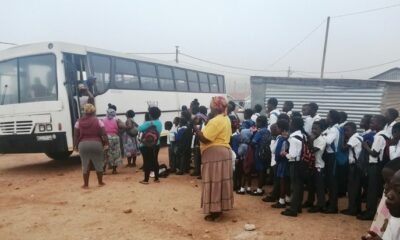News
Pretoria High School for Girls hit by court setback in racism-investigation battle

A school under scrutiny
When the governing body of the Pretoria High School for Girls (PHSG) knocked on the doors of the Gauteng Department of Education (GDE), asking for a commissioned racism-investigation report, they expected transparency. Instead, they found a wall of procedure. Their attempt to force the release of that report ended this week when the Gauteng High Court, Pretoria, dismissed their application.
From WhatsApp controversy to legal showdown
The roots of the storm trace back to October 2023, when three learners at PHSG alerted school management that a WhatsApp group had been formed by some pupils labelled “whites only” and alleged to have shared racially insensitive messages. The school’s own governing body (SGB) held disciplinary proceedings against the 12 learners involved. All were ultimately cleared on the grounds that the group was deemed private and beyond the school’s direct jurisdiction.
Not satisfied, the department commissioned its own investigation via Mdladlamba Attorneys. The report reportedly found evidence of racial discrimination and institutional shortcomings in the school’s culture and governance. However, while the GDE revealed parts of its findings, it did not hand over the full report to the SGB.
The access-to-information trap
When the SGB demanded the full document, the GDE pointed them to the Promotion of Access to Information Act (PAIA). Under PAIA, the SGB can formally request records held by public bodies rather than receive them automatically. The SGB then sought to have the court compel the department to hand it over ahead of any formal PAIA process.
Judge Graham Moshoana pointed out that although the report exists, the SGB has never viewed or determined its contents. Without knowing what’s in it, the SGB cannot argue that the document is essential to their review application. In his words, the attempt “is like wishing to buy a pig in a poke.” The court therefore refused the bid, stating that the SGB cannot pursue a dual path of review and information access simultaneously.
Why this matters beyond Pretoria
In a society still grappling with the legacy of apartheid and the daily reality of racial tensions, the PHSG case hits a nerve. High-performing schools are under growing pressure to prove they are inclusive, responsive, and free of bias. When a reputed girls’ school becomes the centre of allegations of exclusion and complaints about the process, it triggers broader public concern about how educational institutions handle race and discipline.
On social media platforms like X (formerly Twitter), reactions ranged from frustration that the SGB was being stonewalled to scepticism about whether the report’s findings will ever see the light of day. One user posted, “Transparency begins when you trust the learners and staff to confront issues, not hide them behind process.” Another question: “Is the system protecting institutions more than justice for those harmed?”
A fresh vantage on procedure over substance
While much of the commentary focuses on racism, the court’s ruling underscores a procedural fault line: when an institution commissions an investigation and keeps the findings internal, governance and accountability become blurred. By refusing access at this stage, the court has deferred the question of what the report found and placed emphasis on how organisations seek accountability. In effect, the real story is not only about alleged racism; it is about who holds the keys to the report.
What to watch now
For the SGB, the next battlefield is PAIA. If they lodge a formal access request, they may gain entry to the report, but potentially only after a lengthy process. For the school community, the question remains whether the findings, even if accessed, will translate into meaningful change. Will the institution address the cultural issues flagged? Will learners and parents receive feedback?
For the broader education sector, this verdict signals two things: one, that regulations about information access are being enforced; and two, that institutional transparency in schools remains a work in progress. In a country where trust in institutions is fragile, this case will continue to draw attention.
Also read: Cedrick Nkabinde Tells Parliament: ‘I Have Nothing to Hide’ as Police Interference Probe Deepens
Follow Joburg ETC on Facebook, Twitter, TikT
For more News in Johannesburg, visit joburgetc.com
Source: IOL
Featured Image: News24



























